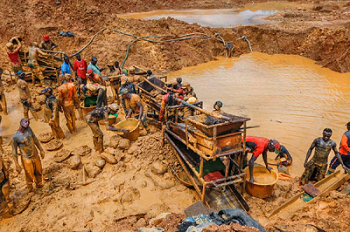
The politics of illegal mining: Majoring in minors?
When US former President Barrack Obama decided to visit Ghana during his tenure of office, excitement greeted the air.
Advertisement
It was justifiably so because a visit by the President of the wealthiest country in the world, naturally, puts the flag of Ghana up there, at least, for investors. For some political scientists, the expectation was for a pronouncement of a major foreign policy statement, and he did; Ghana needs strong institutions.
It is a truism that where institutions exist and work, strong men are not required for effective leadership. Ghana has institutions but one may not be entirely wrong to argue that our institutions are only necessary but not sufficient conditions to achieve the objectives which the drafters of the Constitution purposed. In other words, any President who so desires can use the institutions to suffocate his/her detractors or opponents.
The above is the context within which I want to share my views on the ongoing onslaught of our environment, mainly due to the activities of illegal miners. It must be noted that the Collective Rights of human beings that were proclaimed in the 1970s centred on the rights to peace and development as well as the right to a clean and sustainable environment.
Illegal Mining/Arrest
Illegal mining in Ghana has thwarted that effort, as people in these areas are stifled of land to farm, and potable water as well as denying the body cells clean oxygen to perform functions that keep us alive. This is an infringement of the first, second and third generation of human rights.
The fight against the destruction of the environment must, therefore, be sustained despite the greed and selfish imposed ‘restrictions’. The popular saying that when two elephants fight, it is the grass that suffers, suffices the running story on the ‘arrest’ of the former Chairman of the Inter-Ministerial Committee on Illegal Mining (IMCIM), Professor (Prof.) Kwabena Frimpong-Boateng.
The arrest of the professor raises so many issues, ranging from lack of partiality in the workings of state institutions on the part of those surprised by the events leading to the arrest of the professor, and equality before the law on the part of those who defend the arrest.
While these antics are ongoing, only nature knows what is happening in the forest and the people behind it, hence defeating Thomas Hobbes’s claim that in politics, the individual desires to preserve his life and his goods, and the role of government is to serve these ends.
To fail to fathom that most politicians are rational actors seeking their selfish interests and doing everything humanly possible to achieve this at the expense of the greater good of posterity is more dangerous than the presence of a false oracle.
In the substance of politics, Appadora, an Indian professor of political science, reiterated that sovereignty means supremacy, and is akin to the power of the state to make and enforce laws ‘with all the means it cares to employ’. This is exacted through the agency of the government. It would be good if our government cares to employ all the means to prosecute and bring to finality, individuals and companies linked to the deadly onslaught on water bodies, with the might it does to the likes of Prof. Frimpong-Boateng.
Science has proved that illegal mining endangers the environment and threatens water bodies significantly. For instance, it causes water contamination by polluted runoff or through chemical spills that leach toxic materials into the surrounding environment. This can also result in land subsidence, which can alter the landscape and threaten ecosystems with life-threatening implications.
Illegal mining is also said to be a major causative factor in deforestation, as trees and vegetation are removed to make way for these mining activities. Such activities can lead to soil erosion and have a devastating effect on local wildlife. Another serious impact is its contribution to climate change. The destruction of natural habitats and the release of pollutants certainly impact greenhouse gas emissions, which contribute to the worsening effect of climate change.
Enforcement
While the brouhaha surrounding the ‘prosecution, persecution or interrogation’ (whichever it is) of Prof. Frimpong- Boateng is ongoing, let there be a corresponding increase in enforcement of existing laws and regulations, to demonstrate the government’s commitment to the fight against illegal mining. This may entail increasing fines for offenders, strengthening monitoring and surveillance technologies, and making chiefs lead the hiring and training of people to monitor illegal mining sites across the country.
Additionally, the state should consider the creation of a better incentive for licensed miners to adopt more responsible mining practices that will prevent cyanide from being carried to nearby water bodies. These incentives could include name and praise rewards for companies that develop and use sustainable mining methods or support local communities in a realistic reclamation of lands.
Above all, education and public awareness campaigns should be intensified and sustained to inform people about the rate at which illegal mining is pushing people faster to the grave.
The writer is a lecturer at the Department of Political Science Education, University of Education, Winneba.




